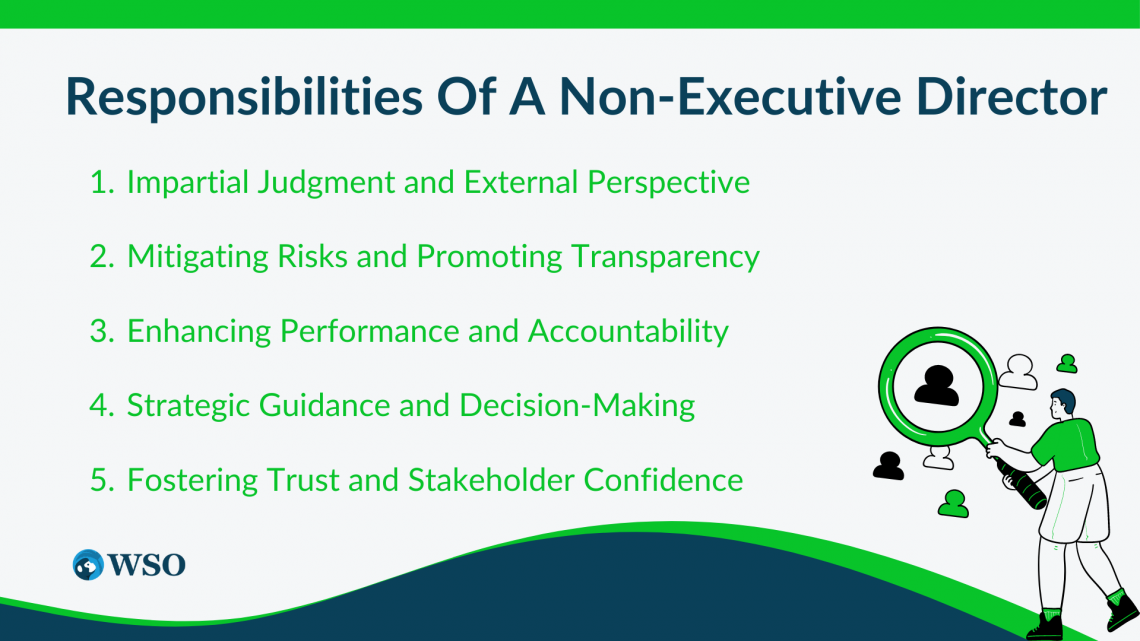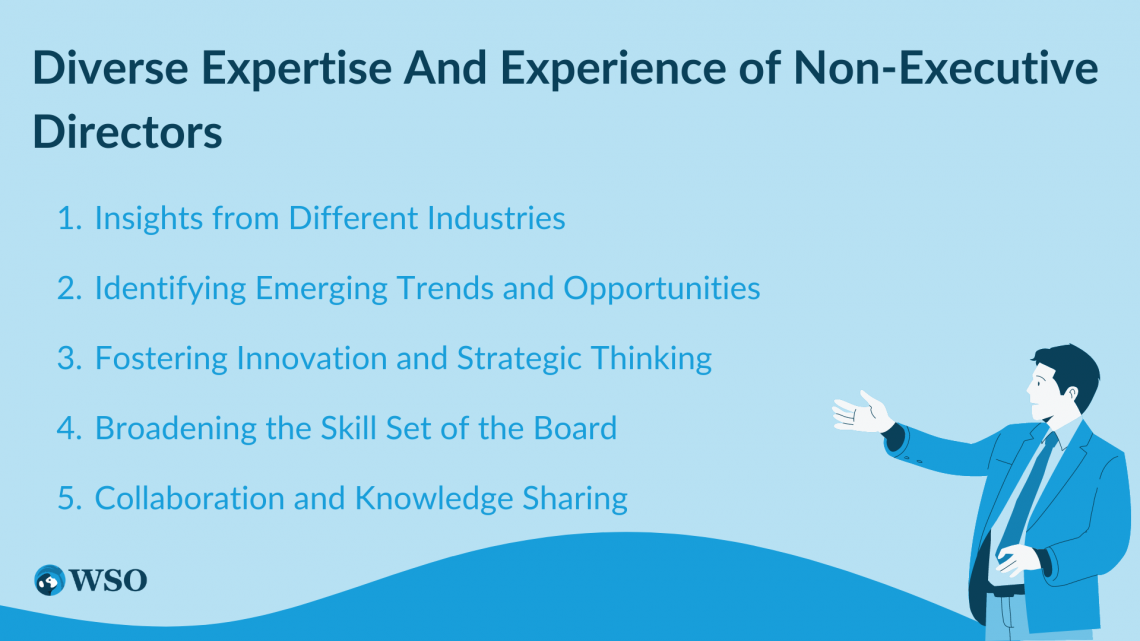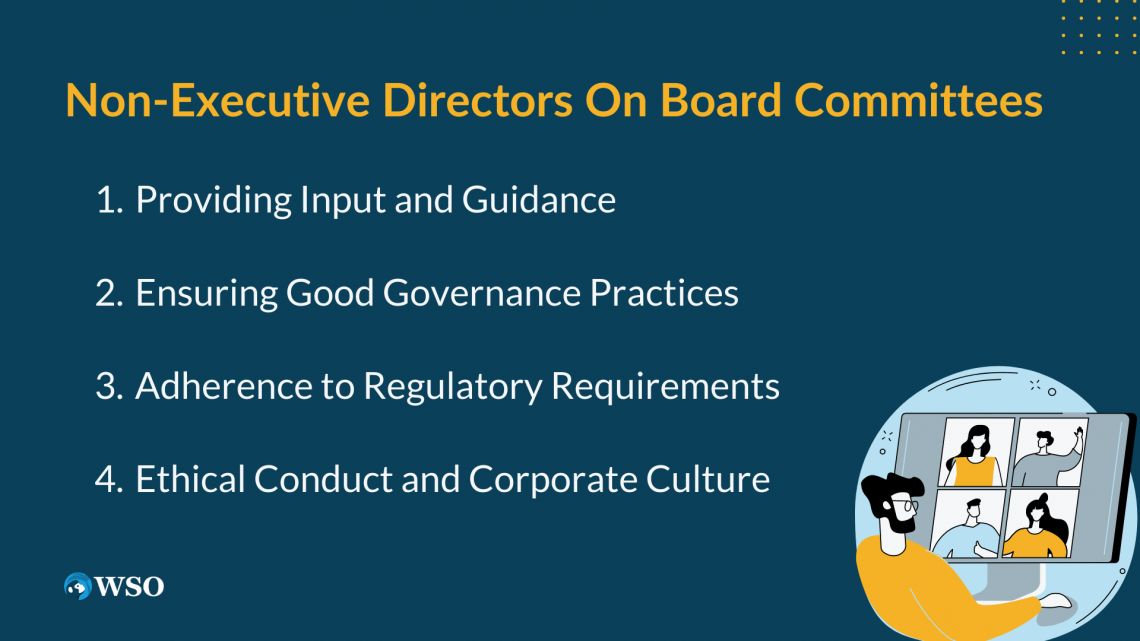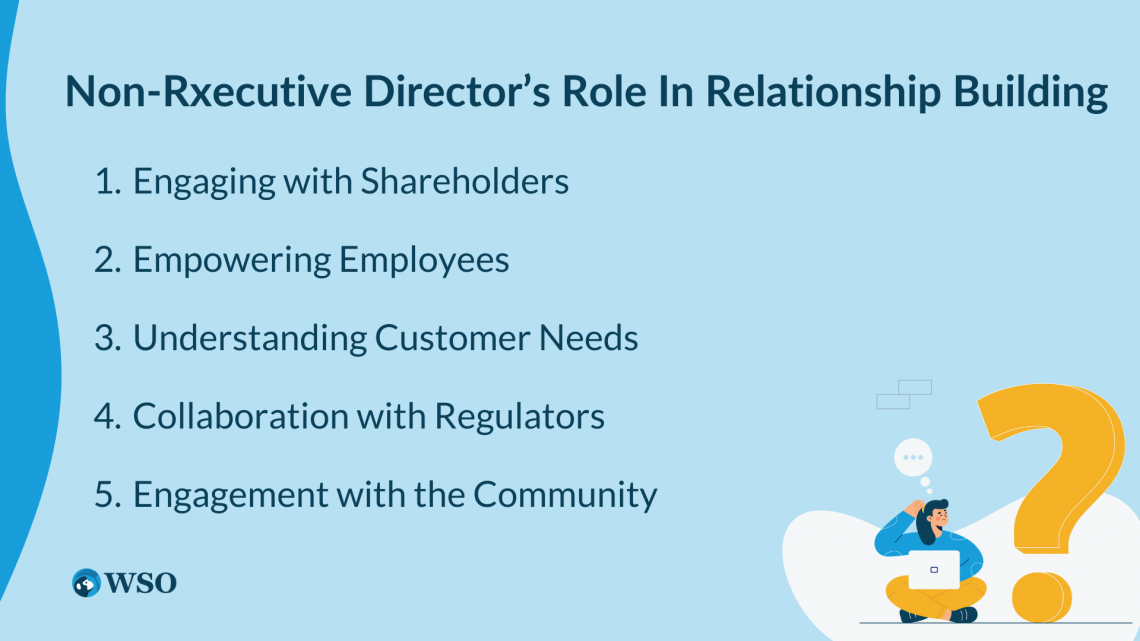Non-Executive Director
Non-executive directors play a crucial role as guardians of good governance within organizations
What Is a Non-Executive Director?
A non-executive director is a member of a company’s board of directors who does not hold an executive office. Non-executive directors(NEDs) act as independent advisors and are not responsible for the daily operations of the company.

Acting as guardians of good governance, they offer impartial judgment on board decisions, challenging the status quo when necessary and upholding ethical conduct and regulatory compliance.
Through diligent scrutiny of management actions and corporate performance, they help mitigate risks, promote transparency, and enhance accountability within the organization.
Furthermore, NEDs actively participate in board committees, including audit, remuneration, and nomination committees, to ensure focused examination of critical matters.
They often have extensive careers in executive or senior management roles, which have provided them with valuable insights, knowledge, and skills relevant to board-level responsibilities.

The ideal NED would have several decades of experience under his belt, possessing a deep understanding of corporate governance.
However, there are instances where individuals with relatively fewer years of experience but possessing exceptional qualifications, specialized expertise, or unique perspectives may be considered for non-executive director roles.
By lending their expertise to these committees, they contribute to effective risk management, executive compensation practices, board composition, and other vital areas of governance.
Their involvement ensures specialized attention and comprehensive evaluation of critical aspects, fostering sound decision-making and safeguarding the interests of shareholders and stakeholders.

As organizations navigate an ever-evolving business environment, the role of NEDs continues to grow significantly.
Their independent oversight, diverse expertise, and commitment to upholding the highest governance standards contribute to companies' long-term success and sustainability.
In general, NEDs receive financial compensation for their work, and their annual remuneration can fall within the low to mid-six-figures range depending on job scope and firm size.
Key Takeaways
- Non-Executive Directors provide impartial judgment, challenge the status quo, and ensure organizations' ethical conduct and regulatory compliance.
- NEDs mitigate risks, promote transparency, and enhance accountability by scrutinizing management actions and corporate performance.
- Non-Executive Directors contribute diverse expertise to board committees, ensuring effective risk management, executive compensation practices, and board composition.
- NEDs foster trust, stakeholder confidence, and engagement by representing the company's interests and actively engaging with shareholders, employees, customers, regulators, and the wider community.
- Non-Executive Directors enhance board effectiveness and decision-making and drive sustainable growth by bringing fresh perspectives, promoting innovation, and upholding the highest governance standards.
Responsibilities of a Non-Executive Director
Non-executive directors play a crucial role as guardians of good governance within organizations. With such an independent position, NEDs offer impartial judgment on board decisions, providing an external perspective that challenges the status quo when necessary.

This oversight helps maintain a balance of power and prevents undue influence on decision-making processes.
1. Impartial Judgment and External Perspective
One of the key strengths of NEDs is their ability to provide impartial judgment on board decisions. Their external perspective, free from any executive responsibilities, allows them to evaluate matters objectively and without bias.
NEDs contribute to well-rounded discussions and debates by bringing their diverse experience and expertise to the table. They actively question management actions, assess potential risks, and promote robust decision-making that benefits the organization as a whole.
2. Mitigating Risks and Promoting Transparency
By scrutinizing management actions and corporate performance, directors help mitigate risks that could impact the organization.
They ensure potential risks are identified and addressed promptly by asking probing questions, conducting thorough assessments, and challenging assumptions. NEDs also contribute to promoting transparency and accountability within the company.
Note
NEDs oversight helps establish robust reporting mechanisms, ethical conduct, and responsible practices that build stakeholder trust.
3. Enhancing Performance and Accountability
NEDs are a valuable resource for the company's management team and executives. Their independent perspective and expertise enable them to evaluate corporate performance objectively.
Analyzing financial reports, monitoring key performance indicators, and assessing strategic initiatives provide valuable insights and recommendations to enhance the organization's performance.
Note
NEDs also hold management accountable for meeting established goals and objectives, ensuring that the company operates according to its stated mission and vision.
4. Strategic Guidance and Decision-Making
NEDs bring a wealth of knowledge and experience to the boardroom, contributing to strategic guidance and decision-making processes. Their diverse backgrounds and industry expertise enable them to provide informed advice and perspectives on complex matters.
They offer valuable insights into emerging trends, market shifts, and industry best practices. Their contributions help the board make well-informed decisions that steer the organization in the right direction.
5. Fostering Trust and Stakeholder Confidence
NEDs play a crucial role in fostering trust and confidence among stakeholders. Promoting transparency, accountability, and ethical conduct contributes to building a positive corporate culture.
Note
NEDs act as ambassadors for the company, representing its interests to shareholders, employees, customers, regulators, and the wider community.
With active stakeholder engagement (understanding their concerns and expectations), non-executive directors ensure that the organization's actions align with their needs.
Diverse Expertise and Experience of Non-executive Directors
Non-executive directors bring a wealth of experience from various industries and disciplines, allowing them to complement executive directors' skills.

With directors with expertise in finance, legal, marketing, or technology, companies can tap into a broader range of knowledge and experience.
1. Insights from Different Industries
The presence of non-executive directors with diverse expertise brings about a notable benefit: their capacity to provide insights from various industries. Their exposure to different sectors gives them a wider viewpoint and a more profound understanding of market dynamics and trends.
This cross-industry knowledge allows them to identify emerging opportunities and potential risks that may not be apparent to those solely focused on the organization's sector.
Note
By leveraging their diverse experience, they can foster innovation and strategic thinking within the boardroom.
2. Identifying Emerging Trends and Opportunities
NEDs, with their diverse expertise and experience, are well-positioned to identify emerging trends and opportunities in the business landscape.
By staying informed about market developments, technological advancements, and consumer behavior, they can provide valuable insights that can shape the organization's strategic direction.
Note
Their ability to spot new opportunities and potential disruptions helps companies stay ahead of the curve and adapt their strategies accordingly.
3. Fostering Innovation and Strategic Thinking
The presence of NEDs with diverse backgrounds encourages a culture of innovation and strategic thinking within the organization. They challenge conventional wisdom and stimulate creative problem-solving by bringing fresh perspectives and alternative approaches.
They can provide valuable input on strategic initiatives, product development, and market positioning, pushing the company to explore new avenues and seize competitive advantages.
4. Broadening the Skill Set of the Board
Having NEDs with diverse expertise and experience broadens the skill set of the board as a whole. This diversity ensures that the board can access various perspectives and knowledge when making important decisions.
Note
They can offer guidance and support in areas where executive directors may have limited expertise, enhancing the overall decision-making capabilities of the board.
5. Collaboration and Knowledge Sharing
The presence of directors with diverse backgrounds fosters collaboration and knowledge sharing within the boardroom. Their varied experiences create an environment where different ideas and approaches are encouraged and valued.
They can share industry-specific insights, best practices, and lessons learned, enriching the board's collective knowledge. This collaboration enhances board effectiveness and ultimately benefits the organization as a whole.
Non-executive Directors on Board Committees
Non-executive directors often serve on board committees, such as audit, remuneration, or nomination committees, to ensure proper oversight and specialized focus.

They actively participate in discussions, providing input and guidance on risk management, executive compensation, and board composition matters.
1. Providing Input and Guidance
Directors actively participate in committee discussions, providing valuable input and guidance on matters within their respective areas of expertise. For example, the audit committee offers insights into risk management, internal controls, and financial reporting processes.
In the remuneration committee, they provide their perspective on executive compensation, ensuring it aligns with the organization's strategic objectives and industry standards.
Note
In the nomination committee, they contribute to discussions on board composition, evaluating potential candidates, and ensuring a diverse and qualified board.
2. Ensuring Good Governance Practices
Directors play a crucial role in promoting good governance practices within the organization. By actively monitoring and reviewing governance frameworks, policies, and procedures, they help establish a strong foundation for effective decision-making and risk management.
They provide independent oversight, challenge management when necessary, and contribute to establishing robust governance structures.
3. Adherence to Regulatory Requirements
Directors are responsible for ensuring the organization's compliance with regulatory requirements. They stay informed about relevant laws and regulations that impact the company's operations and industry.
By monitoring regulatory changes, they help the board navigate potential risks and ensure the organization's activities remain in line with legal obligations.
Note
They work closely with management and fellow board members to establish appropriate compliance mechanisms and ensure a culture of regulatory adherence throughout the organization.
4. Ethical Conduct and Corporate Culture
Directors are pivotal in promoting ethical conduct and fostering a positive corporate culture. They set the tone from the top and ensure that ethical standards are upheld across all levels of the organization.
They guide on matters of integrity, corporate social responsibility, and stakeholder engagement.
Non-executive Director’s Role in Relationship Building
Non-executive directors' key responsibilities are building strong relationships and effectively engaging with stakeholders. This section will explore how NEDs act as a bridge between the board and external stakeholders, representing the company's interests and fostering positive relationships.

By engaging with shareholders, employees, customers, regulators, and the wider community, they gain valuable insights, understand concerns, and contribute to the organization's long-term sustainability.
1. Engaging with Shareholders
Directors play a crucial role in shareholder engagement, ensuring their voices are heard and their interests are represented. They attend shareholder meetings, engage in discussions, and address concerns or questions raised by shareholders.
By actively participating in these interactions, they foster transparency, build trust, and strengthen the company's and its shareholders' relationship.
2. Empowering Employees
Directors understand the importance of employee engagement and its impact on organizational success. They actively engage with employees through various channels, such as town hall meetings, employee surveys, and informal discussions.
Note
By listening to their perspectives, they gain valuable insights into the organization's culture, employee morale, and potential areas for improvement.
3. Understanding Customer Needs
Directors recognize the significance of understanding and meeting customer needs. They engage with customers through market research, customer feedback sessions, and industry events.
By actively seeking customer perspectives, they gain valuable insights into market trends, emerging needs, and potential areas for innovation.
This understanding helps the board make informed decisions and develop strategies that align with customer expectations, ultimately contributing to the organization's growth and success.
4. Collaboration with Regulators
NEDs establish constructive relationships with regulators, understanding the importance of compliance and regulatory adherence.
They engage in discussions with regulatory bodies, seek clarity on regulatory requirements, and ensure the organization's activities align with the applicable laws and regulations.
Note
By actively collaborating with regulators, NEDs contribute to a positive regulatory environment, minimizing risks and ensuring the organization operates within the legal framework.
5. Engagement with the Community
NEDs recognize the broader impact of the organization on the community and actively engage with relevant stakeholders.
By understanding community concerns and perspectives, NEDs help shape the organization's actions, ensuring they align with societal expectations and promote positive social impact.
Conclusion
The presence of non-executive directors in the corporate landscape is invaluable. Their wealth of expertise, independent oversight, and strategic guidance significantly enhance the effectiveness and decision-making of boards.

The number of years of experience typically required to become a non-executive director varies depending on factors such as industry, organization, and board expectations.
While there is no fixed requirement, non-executive directors generally possess substantial professional experience and expertise in their respective fields.
With their diverse backgrounds and experience, NEDs bring a fresh perspective and valuable insights that complement the skills of executive directors. This collaboration promotes good governance and sets the foundation for sustainable growth.
Note
NEDs are critical in helping organizations navigate these challenges by providing impartial judgment and challenging the status quo when necessary.
Their external perspective brings a broader view of industry trends, emerging risks, and opportunities, enabling boards to make informed decisions that drive innovation and strategic thinking.
Their commitment to ethical conduct and responsible business practices sets the tone from the top and fosters a positive corporate culture. This trust is vital for the long-term success and reputation of organizations.
Their independent oversight, strategic guidance, and commitment to good governance ensure that organizations operate in the best interests of shareholders and stakeholders.

NEDs actively contribute to establishing robust governance frameworks, monitoring regulatory compliance, and mitigating risks.
Their contributions, expertise, and dedication to upholding the highest standards benefit not only the companies they serve and the broader business community.
With their diverse backgrounds and commitment to ethical conduct, NEDs play a pivotal role in driving sustainable growth and ensuring the continued success of organizations in a dynamic and competitive business landscape.




or Want to Sign up with your social account?